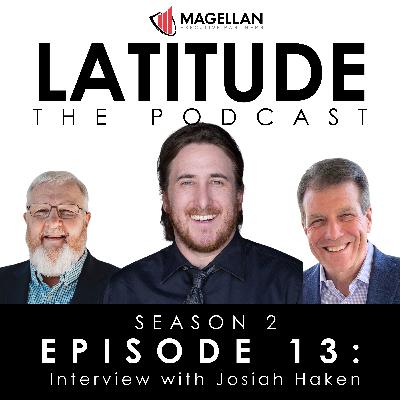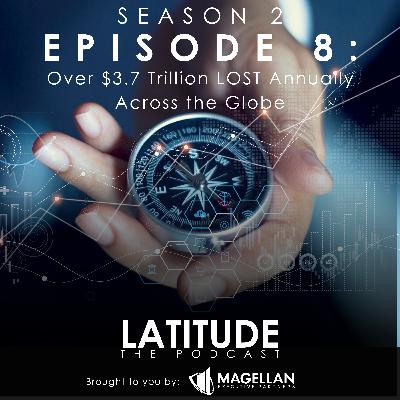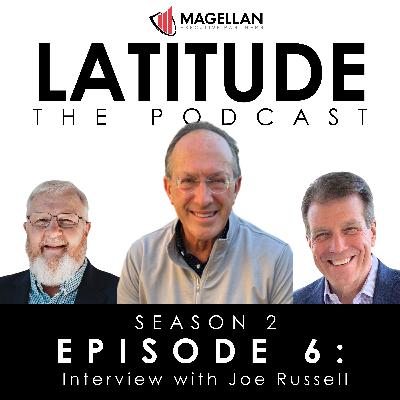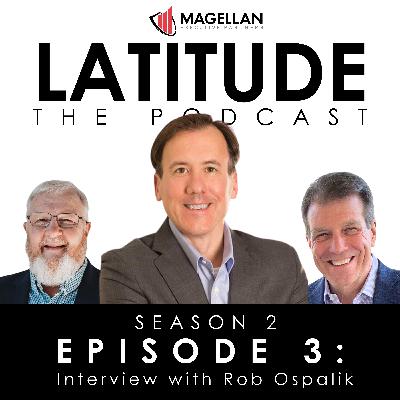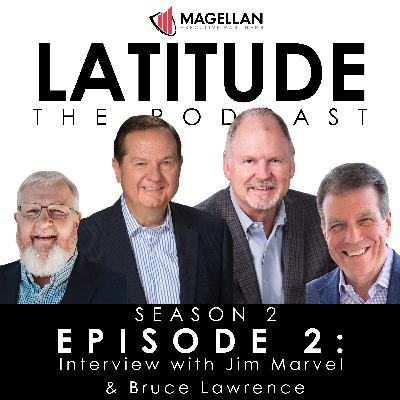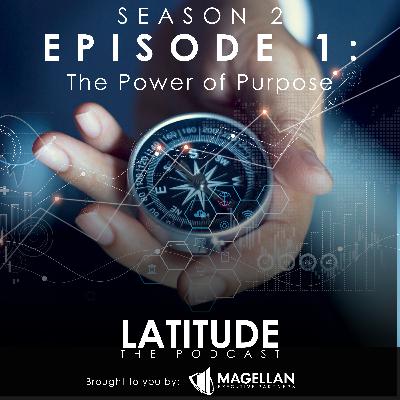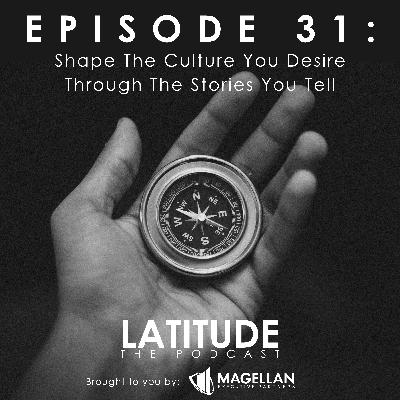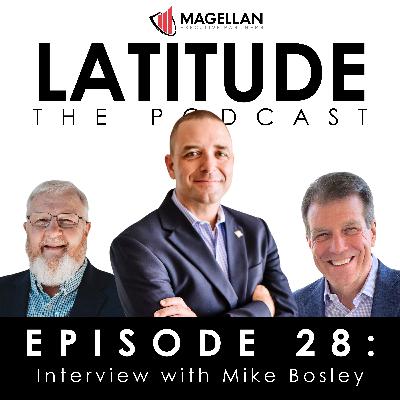Discover Latitude – Navigating Business Culture
Latitude – Navigating Business Culture

Latitude – Navigating Business Culture
Author: Magellan Executive Partners
Subscribed: 3Played: 20Subscribe
Share
© 2023
Description
Magellan Executive Partners is pleased to bring you the Latitude podcast, a show about navigating business culture. Your hosts, Rod Beeler and Brian Gareau will share strategic, tactical, and practical ways to make sure your business culture doesn't blend in with the crowd. Their wisdom in this area comes from long, successful careers in a Fortune 100 corporation and as active, passionate practitioners themselves.
Some organizations oversimplify culture. They gloss over the critical elements that help explain and reinforce why we do things. Great intentions give way to limited action and the result is a culture that fails to retain and engage people. Sometimes all we need are small reminders to set us up for greatness. Magellan’s Latitude podcast is intended to help you determine your culture’s accurate position, speed, and heading to help you navigate to the performance you want. We hope you will join us.
Some organizations oversimplify culture. They gloss over the critical elements that help explain and reinforce why we do things. Great intentions give way to limited action and the result is a culture that fails to retain and engage people. Sometimes all we need are small reminders to set us up for greatness. Magellan’s Latitude podcast is intended to help you determine your culture’s accurate position, speed, and heading to help you navigate to the performance you want. We hope you will join us.
45 Episodes
Reverse
Looking for an executive summary of what a dozen high-performing leaders think, communicate, and do every day to differentiate their organization from competitors and other employers? If so, then you found it! This special 35-minute episode covers Season 2’s 13 unique episodes and five major themes that ran throughout it including: The power of purpose (why does your organization exist?) Tapping into the voice of employees (VOE) for continuous improvement Modeling what you want more of Serving customers with more than transactional activities Setting your organization up for greatness through simple behaviors Whiteboard Notes: Reflection Questions: Does your organization’s ultimate purpose differentiate it as a provider? Employer of choice? How do you know? Do employees have the ability to respectfully express ideas, concerns, and perspectives without fear of consequences? How do you know? What are your recent trends? Where is status quo bias limiting individual and organizational performance? What transactional exchanges with customers are building relationships? Breaking relationships? Are organizational culture, values-based behavior, and employee engagement considered and treated more as an expense or investment in your organization? A need to do or nice to do? Scan this QR code and see a complete listing of all 45 episodes of Latitude: Navigating Business Culture.
How could stopping this time, instead of walking by, change a perspective, level of trust, a relationship, a challenging situation? Could something so simple help reinforce that a person and/or situation really matters? Join us as we discuss with Josiah Haken and his experiences of leading an organization that serves 50,000 ‘neighbors without doors’ (people experiencing homelessness). Josiah shares many practical solutions that apply to any size organization, whether it is public, private, for-profit, or not-for-profit. Topics covered include: The power and influence of words Breaking limiting biases Collaborating compared to Competing for limited resources Two simple questions to move from transactional to relational behaviors Whiteboard Notes: Reflection Questions: How does the language commonly used in your organization reinforce inclusion, trust, teamwork, and self-esteem? Is your organization addicted to any processes that result in negative consequences for your employees? How does your measurement system account for both the transaction getting completed and how it influences a relationship? What relationships are currently more competitive than collaborative and hurting performance? What behaviors are tolerated that hurt performance because we just walk by them?
One of the costliest barriers to organizational performance is unresolved crucial conversations. Research has found nearly 70% of employees are avoiding difficult conversations with their boss, colleagues, or direct reports. Workplace health is suffering - trust eroding – and organizations underperforming. Join us as we discuss with Joe Buchanan his experiences of taking over a 30+ year old organization that was acquired just before the pandemic hit. Joe shares many practical solutions including: Constantly staying relevant to customers’ needs/wants The power of Dream Days and Coffee & Connect Modifying hiring criteria to accelerate creativity The mind shift to problem solving Ownership of purpose Whiteboard Notes: Reflection Questions: What would employees say differentiates your organization from all the others out there (competition)? Is it safe to ‘test boundaries’ in your organization or are rules, policies, and expectations iron clad? How well do your leaders define reality? How well is it understood? How do you know? What specifically is done in your organization to show and tell employees they matter? Who is your Listener Engagement Director for customers? How about for employees?
According to Fortune magazine, “business leaders believe the importance of a company’s culture has increased in the current business climate”. In order to maximize the human potential (skills, knowledge, abilities) within any organization, both culture and leadership style must be proactively managed. Join us as we discuss with Tessa Dent her global experiences and how an organization’s culture (the accepted or perceived way we do things here and why) and leadership impacts: Strategy execution Sustainability Managing change Employee commitment, effort, loyalty (engagement) Whiteboard Notes: Reflection Questions: How effective is your organization in routinely gathering (formally and informally) the voice of the employee (VOE) – asking, using, and recognizing its’ value? Is change management in your organization treated more as a methodology or mindset that influences behavior? What biases may be creating ‘waste’ in your organization? How can you proactively address this? Do you effectively know and measure the key tangible elements of your organization’s culture? Does your organization have the right balance of task-oriented and transformational leaders?
We choose what we pay attention to. Choose wisely because in an organization what leaders pay attention to and measure will fix firmly and deeply the way employees think, feel and act. It will drive organizational culture and ultimately performance. Join us as we discuss with Florian Kluge his vast experiences as a Financial Officer for two German companies operating in the U.S. Topics discussed include: The power of purpose Underestimating the importance of identifying key criteria to achieve results Making effective decisions Leading when things are going well – not getting complacent Balancing business needs with customer and employee needs Whiteboard Questions: Reflection Questions: Does your organization have a succinct purpose statement – the fundamental reason you exist? How well do your employees understand the critical criteria to achieve key success metrics? How much is lost productivity and human capability costing your organization? Balancing requires holding on to or letting go. Are there cultural elements (things reinforced and/or tolerated) that are hurting performance?
An entrepreneur sees what some would call ‘impossible’ as ‘possible.’ They make a choice to go and get it! No obstacle is too big. Join us as we discuss with Abby Reel her amazing start-up and success with a dinner theatre and events center. Topics discussed include: Creating a new business model compared to adopting former owners Considering it a privilege to serve customers, not a burden Establishing hiring criteria that protect your culture Modeling, coaching, and teaching what you expect from others Whiteboard Notes: Reflection Questions: Do you believe employees can work hard and have fun – that these are not mutually exclusive? Why or why not? What are all the ways you ask employees to be flexible for the business? Provide flexibility for employees to have meaningful lives outside of work. How well does your organization celebrate its clients/customers and employees? What simple, high-touch activities tell customers they are special and important?
Poor customer service (CS) costs over $3.7 trillion dollars annually across the globe – up 20% from the year before. Rod and Brian discuss a variety of topics, using research and real-life examples, including: How critical it is to treat CS from the inside/out – practicing internally with each other the behaviors expected externally with customers/clients. Importance of ‘convenience’ to the customer and determining specifics through ongoing gathering of the voice of the customer (VOC) Truly empowering CS reps to make decisions while minimizing ‘asking for permission’ Avoiding the trap of automating broken, ineffective processes Whiteboard Notes: Reflection Questions: How does your organization communicate, teach, and reinforce the importance and impact every employee has on the total customer experience? Regarding CS, what metrics matter the most from your customer’s perspective? How do you know? How does your organization capture and learn both CS best practices and lessons learned? What decisions can your employees make without ever asking for permission?
Discover how the global pandemic accelerated digital adoption and reduced some resistance to change in a major healthcare organization. Jennifer Junis, Senior VP of OSF OnCall, will share many valuable lessons learned including the importance of: Clarity, through the use of Guiding Principles, to drive consistent, aligned decision-making. Evidence-based Management instead of fads or opinions. Realistic expectations when developing a high-performance culture. Whiteboard Notes: Reflection Questions: What do employees in your organization use (documents/tools/techniques) to help drive consistent, aligned decisions with your mission? What innovative ideas might your organization be missing by only benchmarking within your own industry? Where does your organization need to ‘stay the course’ and be realistic on its’ milestones of success?
This episode features a conversation with the founder and owner of Russell Cycling and Fitness – a 45+-year-old small business that has been named several times as a Top 100 Best Bicycle Retailer in the United States. Joe Russell will share many valuable lessons learned, including the importance of: Recruiting for cultural fit. Teaching inspiration and pride. Doing common things uncommonly well in customer service. Whiteboard Notes: Reflection Questions: How many of your employees truly ‘hate’ their jobs? It’s just a paycheck. What can you proactively do to help inspire them? What common things in customer service does your organization do uncommonly well? How much pride is at the center of your business today? What could be done to improve this even more?
This episode features a conversation with a President of Client Services responsible for six geographic regions, 260+ clients, and 7000 employees. Among the many ‘nuggets’ you will hear how they: Recalibrate constantly to meet changing clients’ needs Work to create a ‘safe’ culture so tough questions can be asked and answered Make sure the right voice/perspective/people at the table to make the best decision Whiteboard Notes: Reflection Questions: How well does your leadership team create strong Vision, Execution, and Legacy for its employees? Do your organization’s incentives enhance collaboration across all functions and locations? Does your organization use data and analytics ‘more often’ to ask better questions or answer all the questions?
Welcome Back! In Season 2 we are revisitng some of our favorite episodes for all our new listeners, this is REWIND WEDNESDAY! In this episode, Rod and Brian interview the Founder and President of Creekmur Wealth Advisors. This highly successful business has grown since its inception to now serving over 1700 client households, managing over $420M of assets, and advising on $1B. Episode Summary: John shares how better understanding, acting on, and actively managing their culture like an investment has created differentiation and much success. He describes his organization’s culture with this simple formula. Culture = The sum of all the decisions all of his employees make to serve people Join us for this real-life success story of an organization deciding the best way forward was to chart a different course than others. Whiteboard Notes: Reflection Questions: What concept or idea that John shared: Reinforces something you are currently doing to navigate business culture effectively? Presents a new/different perspective that is worthy of further discussion for possible execution?
This episode features a conversation with a partner of a private investment firm managing nearly $300B in investments. Their key principles of Integrity, Transparency, Teamwork, and Keeping Clients First have differentiated and distinguished them both as a provider and employer. Whiteboard Notes: Reflection Questions: How transparent is your organization when dealing with clients and employees? What is your organization’s tolerance level for individuals who put themselves ahead of clients, customers, the overall organization, and fellow employees? Are there any relationships (internal or external) that are imbalanced between transactional and interpersonal? If so, what impact is this having on performance?
This episode features Magellan Executive Partner’s two corporate governance experts. They will share how and why corporate governance for any size organization (profit or non-profit) will help build an environment of trust, transparency, and accountability to be a more sustainable, resilient organization. Whiteboard Notes: Reflection Questions: Would your organization benefit from developing and/or refreshing its’ Board’s charter – the roles and responsibilities of the board members, chair, and other key roles to ensure clarity and alignment? How confident are you regarding the effectiveness of your Crisis Management Plans? When was the last time your Board did a self-assessment on its’ overall effectiveness? How effective is your new board member orientation? If your organization currently does not have a board, would it benefit from an “advisory board” that provided guidance to Executives and helped identify potential risks/blind spots and their mitigation?
Season 2, Episode 1 addresses a simple but powerful question – What is the purpose of your organization? Unlike your mission that describes what you do and for whom, a purpose provides the reason or reasons you exist – the why. Purpose drives performance and perspective. It can help create passion, spark energy, and accelerate excitement for the future. Learn more, including a significant, more inclusive change in the definition of the ‘purpose of a corporation’ by an association of CEOs at The Business Roundtable. Whiteboard Notes: Reflection Questions: Is this a good time to: Create and/or revise your organization’s purpose statement? Make sure our purpose is something all of your key stakeholders can align and support? Clarify how your organization’s values and purpose complement each other?
Please join us for episode #31 as we ‘connect the dots’ after interviewing an outstanding group of executives over the past six months on our podcast. This episode focuses on some key stories that ‘stuck’ with us. Why is that important? Research at Stanford University concluded that “our brains are not hard-wired to understand logic or retain facts for very long. Our brains are wired to understand and retain stories.” Whiteboard Notes: Reflection Questions: What stories do your employees share that preserve and pass on crucial organizational knowledge and values? These stories keep your current culture alive! What stories does your organization use to help employees better understand other people and their perspectives? Everyone has a story to tell. How does your organization encourage, capture, and share some of their compelling stories?
10 high-performing executives 20 great reminders on leadership & communication 30-minute investment of your time Please join us for episode #30 as we ‘connect the dots’ from interviewing an outstanding group of executives over the past six months on our podcast. Whiteboard Notes: Reflection Questions: What percentage of your total workforce’s capabilities (skills, knowledge, effort) are you currently tapped into? What is this untapped human capability costing your organization? What ongoing processes do you use to actively listen to employees’ opinions, concerns, and wants/needs? Coachability requires self-reflection, honesty, and awareness that you have some blind spots. They are common and natural. How coachable are you?
During the past year, we have been honored to have had a dozen high-performing executive guests on our Latitude podcast. One of the fundamentals they all discussed was a passion and discipline to create organizations that do common things uncommonly well. Please join us for episode #29 as we ‘connect the dots’ from these 12 leaders’ insights regarding mission, vision, values, strategy, and culture. Whiteboard Notes: Reflection Questions: Research shows most US organizations have a mission, vision, core values, and strategy. However, employee understanding drops off significantly in actually knowing and actively living them. How would your organization stack up in knowing and living these critical foundational goals/objectives? How do you know? Ultimately your workplace culture is shaped by the stories both told and untold. What stories are your employees sharing both inside and out? Do they accurately describe the way you do things and why they are important? Do you have a clear plan in your organization regarding when to: Buy talent (hire) Build talent (train and develop) Borrow talent (contract, temps, consultants) Redeploy existing talent (move internally)
What do businesses, non-profits, and the military have in common? It’s important to have teams and mission-focused leadership. Please join us for episode #28 of Latitude: Navigating Business Culture. Our special guest is Mike Bosley, a multi-talented, hands-on leader who has been a 3X soldier-of-the-year in the Oklahoma Army National Guard, owner of several businesses, on non-profit boards, and teaches graduate business courses on Business Performance Excellence. He’s also currently an executive partner at Magellan Executive Partners. We will discuss the criticalness of mission, people as the greater multiplier, metrics compared to reality, and critical leadership principles. Whiteboard Notes: Reflection Questions: Do your employees believe your mission is worth fighting for with their heads, hearts, hands, and habits? Have you maximized your organization’s human capabilities and capacity? How do you know? When was the last time your key metrics were critically examined against reality?
Gallup research shows that just a 10% improvement in employees' connection with the mission or purpose of their organization leads to more than an 8% decrease in turnover and more than a 4% increase in profitability. Please join us for episode 27 of Latitude: Navigating Business Culture. Our special guest from India is Shridhar Venkat, CEO of The Akshaya Patra Foundation (TAPF). Guided by a vision and driven by values, TAPF is the world’s largest NGO-run school meal program. Their vision is that no child in India shall be deprived of education because of hunger. Their mission is to feed 3 million schoolchildren DAILY in India by 2025. Some key milestones since their inception in 2000 include: Operating over 70 industrial kitchens; servicing 24,000+ schools; and serving over 2.2 million fresh cooked meals on all school days with the help of 9000+ ‘Hunger Warriors’ (employees) Served over 4 billion meals since start-up Been selected as a Great Place To Work In India for 8 consecutive years Featured by Harvard Business School, IIM, MIT Technology Review, Forbes, CNN, BBC, National Geographic, and Discovery Channel Find out how simplicity, clarity, and boldness have created this exceptional organization and record-breaking performance. Whiteboard Notes: Reflection Questions: Do the terms and descriptors used to describe different roles in your organization positively reinforce your desired culture? Example: Hunger Warriors at TAPF. What policies and procedures in your organization send a strong signal that leadership respects and trusts its employees? Example: “No questions asked day off” at TAPF What stories would employees share about your organization that describe the ‘heart’ of what your organization stands for? Example: a paper chef’s hat at TAPF.
This episode features an interview with former Caterpillar Vice President and Corporate Officer, Tom Bluth. Tom shares some great examples from his time in China, France, and the U.S. where key lessons in leadership were learned. Discussions will cover topics such as the importance of core values; leadership expectations; keeping your finger on the pulse; and perspective. He also shares a powerful poem that his father left him on leadership. (see speaker notes) Whiteboard Notes: Reflection Questions: Is your organization’s culture and its’ people a competitive advantage? How do you know? If it is, then how are you leveraging it? If it is not, what corrective actions are being taken? Where have you seen in your organization a leader’s tone and behaviors fundamentally change a situation in a positive way? Make a situation worse? What different perspectives and viewpoints has your internal network provided you? How often do you take time to find a balcony, away from so many daily demands, and look at things from a different angle and perspective? Who are the true bridge builders in your organization? How can you further leverage their special gift? Here’s the poem Tom referred to in this podcast THE BRIDGEBUILDER by Will Allen Dromgoole An old man going a lone highway Came at the evening cold and gray To a chasm vast and deep and wide, Through which was flowing a sullen tide The old man crossed in the twilight dim, The sullen stream had no fears for him; But he turned when safe on the other side, And built a bridge to span the tide. “Old Man,” said a fellow pilgrim near, “You are wasting your strength building here. Your journey will end with the coming day, You never again will pass this way. You’ve crossed the chasm, deep and wide, Why build you this bridge at eventide?” The builder lifted his old gray head, “Good friend, in the path I have come,” he said, “There is following after me today A youth whose feet must pass this way, The chasm that was naught to me To that fair-haired youth may a pitfall be; He, too, must cross in the twilight dim, Good friend, I am building this bridge for him.”



